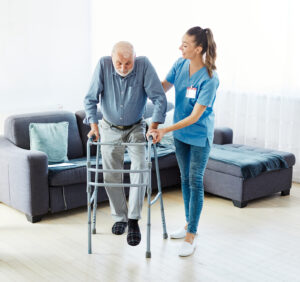How Elder Care Can Help with Mobility Issues

Senior Mobility: Elder Care Arlington VA
While some seniors experience mild challenges with mobility that may include the inability to step over objects, some may not walk completely. Helping your loved ones overcome such issues can be overwhelming for an untrained individual, so it is advisable to onboard a trained elder care expert. Regardless of the cause or severity of the mobility problem, providing support goes a long way in boosting motivation to continue with their day-to-day lives.
Keep Them Active
Many seniors who experience mobility challenges usually stop physically to prevent pain and discomfort. This is usually out of instinct, but it can cause further complications. Once you schedule a consultation with a physician, consider working with an expert to guarantee top-quality elder care throughout the treatment process. Routine exercises are important; a professional caregiver can help your loved one perform recommended tasks safely and comfortably. Additionally, professional caregivers can help with meal preparation, grooming, bathing, and other activities of daily living (ADLs).
Practice Using Mobility Devices
Whether the doctor prescribes a cane or walker, these devices have a learning curve. You may need to be more knowledgeable or skilled to help figure out how the body should move with the device. Some walking devices require strength, such as wheelchairs, and assisting is critical, especially in the initial stages. With that in mind, it may be a good idea to seek professional help until your loved one acclimates. The last thing you want is for the problem to become more pronounced because of improper mobility device use.
Identify Safe Routes
If a senior loved one has mobility issues doesn’t mean they should be bound in the house. However, planning is essential before going for a walk or to a local establishment. Look for safe public areas with elevators, ramps, and others that enhance accessibility. It is important to remember that most public areas are not safe for senior citizens with mobility issues and can compromise strides toward recovery.
Simplify Basic Tasks
An older adult who has difficulty standing or walking for a long time may not be able to handle basic tasks at home. Activities such as cooking can pose great safety risks as they try to maneuver the kitchen. If there are tasks that are difficult for the senior to accomplish, elder care is an option that can help manage the things that need to be done while addressing the mobility problem. A trained caregiver with experience for seniors with mobility challenges can be a valuable resource for your family.
Watch for Change in Their Abilities
Mobility issues tend to worsen over time, especially if symptoms of deterioration aren’t addressed. The situation is more critical when dealing with progressive diseases like Parkinson’s, which can prompt a change in elder care plans and treatment. Although the ability changes may not be a sign for additional assistance, it helps guarantee safety and enhance recovery.
Family caregivers deserve praise and acknowledgment for taking such a proactive approach to elder care. However, working with a professional helps prevent injuries and illnesses by assisting with exercises, meal preparation, mobility, and activities of daily living (ADLs).
